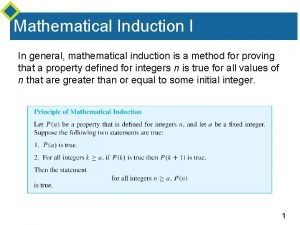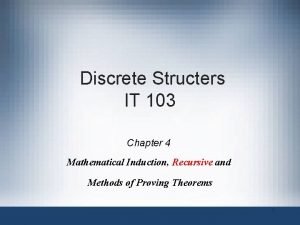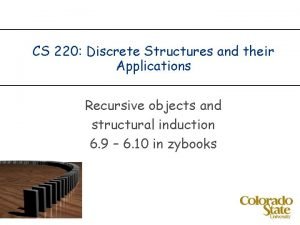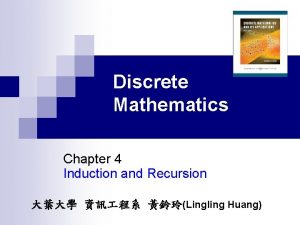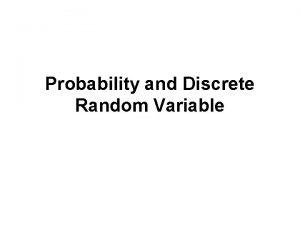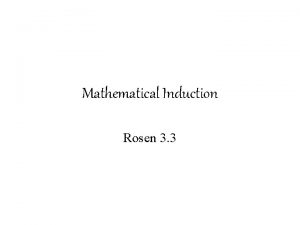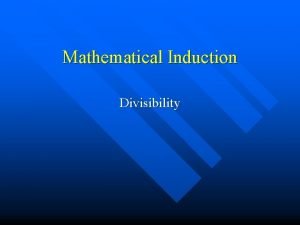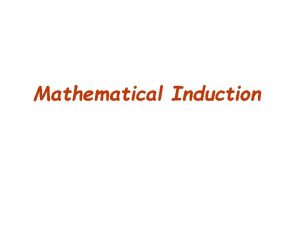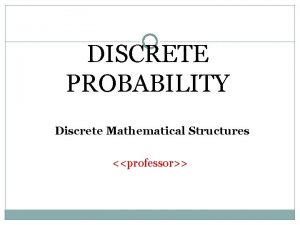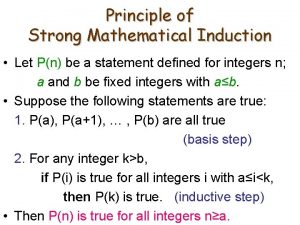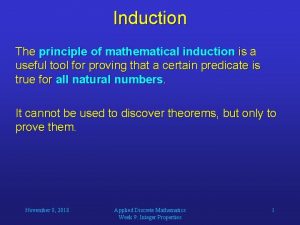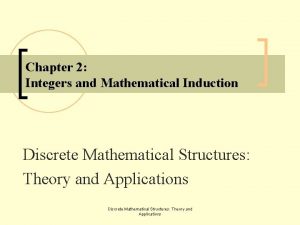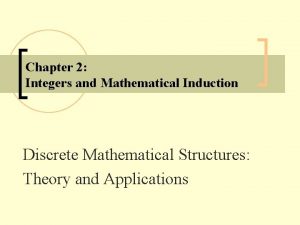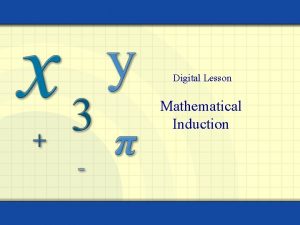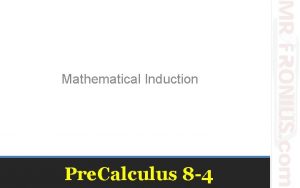Discrete Mathematical Induction Principle of Mathematical Induction Let











- Slides: 11

Discrete Mathematical Induction

Principle of Mathematical Induction Let P(n) be a predicate defined for integers n. Suppose the statements are true: 1. Basis step: P(a) is true for some fixed a Z. 2. Inductive step: For all integers k ≥ a, if P(k) is true then P(k+1) is true. Then for all integers n ≥ a, P(n) is true. 2

Example: Sum of Odd Integers Ø Proposition: 1 + 3 + … + (2 n-1) = n 2 for all integers n≥ 1. Ø Proof (by induction): 1) Basis step: The statement is true for n=1: 1=12. 2) Inductive step: Assume the statement is true for some k≥ 1 (inductive hypothesis) , show that it is true for k+1. 3

Example: Sum of Odd Integers Ø Proof (cont. ): The statement is true for k: 1+3+…+(2 k-1) = k 2 (1) We need to show it for k+1: 1+3+…+(2(k+1)-1) = (k+1)2 (2) Showing (2): 1+3+…+(2(k+1)-1) = 1+3+…+(2 k+1) = by (1) 1+3+…+(2 k-1)+(2 k+1) = k 2+(2 k+1) = (k+1)2. We proved the basis and inductive steps, so we conclude that the given statement true. ■

Extra Examples • Proposition: For any integer n≥ 1, 7 n - 2 n is divisible by 5. (P(n)) • Proof (by induction): 1) Basis step: The statement is true for n=1: (P(1)) 71 – 21 = 7 - 2 = 5 is divisible by 5. 2) Inductive step: Assume the statement is true for some k≥ 1 (P(k)) (inductive hypothesis) ; show that it is true for k+1. (P(k+1)) 5

Proving a divisibility property by mathematical induction Ø Proof (cont. ): We are given that P(k): 7 k - 2 k is divisible by 5. (1) Then 7 k - 2 k = 5 a for some a Z. (by definition) (2) We need to show: P(k+1): 7 k+1 - 2 k+1 is divisible by 5. (3) 7 k+1 - 2 k+1 = 7· 7 k - 2· 2 k = 5· 7 k + 2·(7 k - 2 k) = 5· 7 k + 2· 5 a (by (2)) = 5·(7 k + 2 a) which is divisible by 5. (by def. ) Thus, P(n) is true by induction. ■ 6

Proving inequalities by mathematical induction • Theorem: For all integers n≥ 4, 2 n < n!. (P(n)) • Proof (by induction): 1) Basis step: The statement is true for n=4: 24 = 16 < 24 = 4!. 2) Inductive step: (P(4)) Assume the statement is true for some k≥ 4 ; (P(k)) show that it is true for k+1. (P(k+1))

Proving inequalities by mathematical induction Ø Proof (cont. ): We are given that P(k): 2 k < k! We need to show: P(k+1): 2 k+1 < (k+1)! (1) (2) 2 k+1 = 2· 2 k < 2·k! (based on (1)) < (k+1)·k! (since k≥ 4) = (k+1)! Thus, P(n) is true by induction. ■ 8

Proving inequalities by mathematical induction • Theorem: For all integers n≥ 5, n 2 < 2 n. • Proof (by induction): 1) Basis step: The statement is true for n=5: 52 =25 < 32 = 25. 2) Inductive step: (P(n)) (P(5)) Assume the statement is true for some k≥ 5 ; (P(k)) show that it is true for k+1. (P(k+1))

Proving inequalities by mathematical induction Ø Proof (cont. ): We are given that P(k): k 2 < 2 k. (1) We need to show: (k+1)2 < 2 k+1. (2) (k+1)2 = k 2+2 k+1 < k 2 +2 k (since k≥ 5) < 2 k + 2 k (based on (1)) = 2· 2 k = 2 k+1. Thus, P(n) is true by induction. ■ P(k+1): 10

11
 John 10:22-28
John 10:22-28 Geometric sequence closed form
Geometric sequence closed form Principle of mathematical induction
Principle of mathematical induction الاستقراء الرياضي
الاستقراء الرياضي Structural induction discrete math
Structural induction discrete math Induction and recursion discrete mathematics
Induction and recursion discrete mathematics Probability distribution table example
Probability distribution table example Strong mathematical induction
Strong mathematical induction Induction math
Induction math Mathematical induction divisibility
Mathematical induction divisibility 9-5 geometric series answers
9-5 geometric series answers Mathematical induction
Mathematical induction

